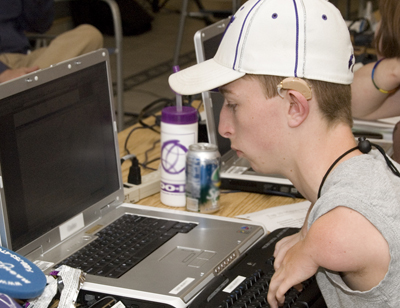Reports from Small Group Discussions

The CBI participants engaged in small groups discussions to answer the question below:
What are some specific things project partners (Seattle Public Schools, Seattle Community College, Bellevue College, and University of Washington) can do in 2009-2010 to increase the participation of students with disabilities in STEM?
Groups were asked to focus on activities that could be conducted in the spring, summer, and fall of the current project year as well as those that could be planned for subsequent years. A summary of the ideas presented follows:
- Arrange for representatives from colleges to visit high schools and talk with students with disabilities about postsecondary education;
- Collaborate with staff in the Seattle Public School system (such as the school nurse) and other vehicles (like posters or the school newspaper) to recruit students for participation in STEM activities;
- Lead career exploration events for high school students such as college transition planning workshops or field trips;
- Promote student self-advocacy through presentations to students and educators. Offer creative ways to help students practice self-identification of their disability;
- Encourage high school and college students with disabilities to participate in existing career exploration activities;
- Host college transition events several times a year on various college campuses;
- Have AccessSTEM brochures available at college disability services offices, veterans' services offices, and high school counseling offices;
- Review student data at partner colleges to locate and recruit students for the AccessSTEM Team;
- Encourage partner institutions to hire AccessSTEM Interns for projects;
- Host a disability summit at a partner college;
- Host an AccessSTEM table at spring career fairs;
- Co-sponsor or host existing events such as Math Day and Pi Day;
- Utilize service learning and cooperative education offices;
- Create and distribute flyers (both printed and electronic) for AccessSTEM activities;
- Provide a link to the AccessSTEM website from partner websites;
- Post testimonials, case studies, and biographies of successful STEM students on the AccessSTEM website;
- Host student panels that enable students with disabilities to share their experiences and break down barriers and stereotypes;
- Partner with K-12 schools to offer staff training on technology and universal design;
- Develop a work group at high schools and offer a training series on relevant, topics of interest;
- Present information on accessibility and universal design directly to Seattle Public School departments, especially in math and science subject areas;
- Offer training for high school and college guidance counselors on the specific needs of students with disabilities as they prepare for the transition to college;
- Continue to assess and improve the accessibility of partner and STEM websites.